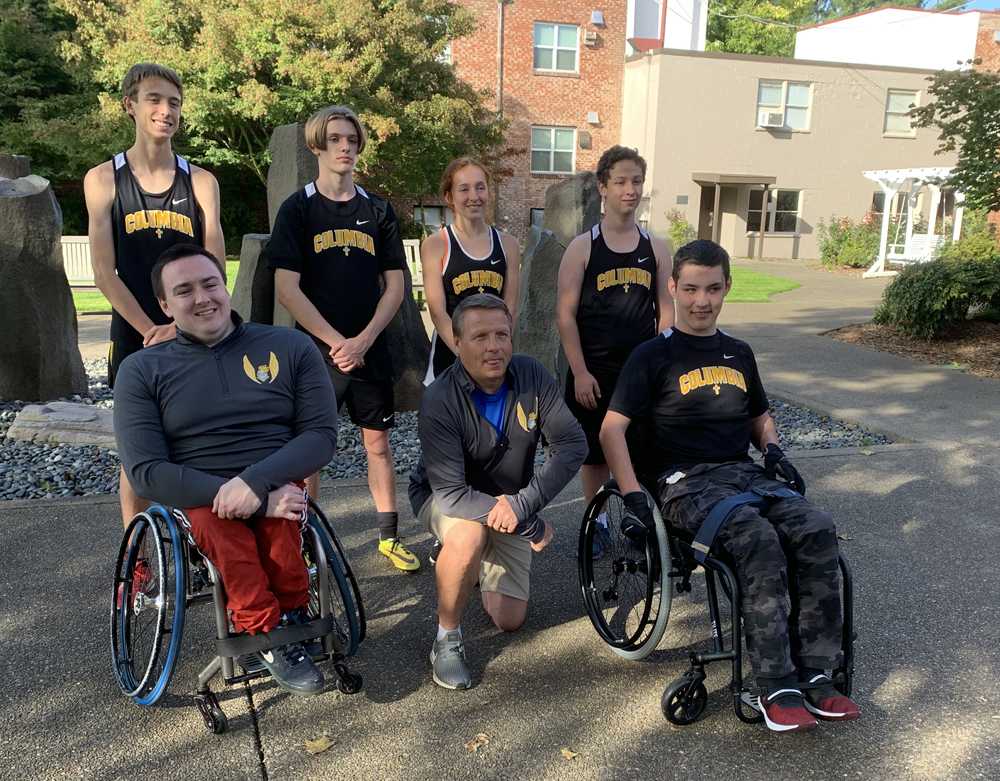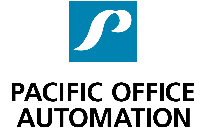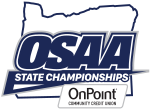
[Editor’s note: The idea behind “Alphabet Stories” is to write one noteworthy athletics-related story about each OSAA-member school. We started with Adrian HS on Sept.18. Today’s story, almost five months later, is about Columbia Christian High School. The goal will be to write two per week. While we will be relying upon athletic directors to furnish story ideas, anyone may offer suggestions by emailing johnt@osaa.org]
“All this time I didn’t know sports could be for us.”
Those are the words of Nicole Adams, whose 17-year-old son, Frank, is a sophomore on the Columbia Christian cross country and track teams.
Frank’s been a varsity athlete for only one year. He has yet to have an official race, because of the COVID-19 pandemic and because he only recently acquired a racing wheelchair.
“Frank learning to work that racing chair was amazing,” said Kevin Yaws, the school’s cross country and track coach. “He would bloody his hands before he would stop. You don’t have a lot of athletes who put that much effort and determination into something.”
***
Frank Adams was born with Pelizaeus-Merzbacher Disease or “PMD.” PMD is a genetic disorder that affects the body’s central nervous system. He cannot walk without support, has vision challenges and is slower verbally than most teenagers, even though he is smarter than smart.
PMD can be very severe and is progressively debilitating. Frank is relatively lucky. His mutation – he’s the only one in the world with it -- is less severe than most. There is hope for a long, healthy and happy life.
***
Frank has been at Columbia Christian since he was in kindergarten. For most of his years on campus, Nicole was with Frank during school, offering academic support and helping him get places with his walker.
“He used the walker because we wanted his body to move,” Nicole explained.
Frank moved into a wheelchair starting in ninth grade. It gave him more freedom and put less stress on his 5-foot-10-inch body as he grew into a man.
It also provided an opportunity…
***
Kevin Yaws has been a coach at Columbia Christian for five years, and the PE teacher -- for all student Pre-k through 12th grade -- for the past two. He is a different kind of coach, one whose focus extends to those who should be active in athletics as much as those who might be champions. Watching his athletic son have to give up organized sports after contracting leukemia changed Yaws’ perspective on the standard rules of sport.
“It’s about being a participant and being there and doing your best,” he said. “We need to focus on students who aren’t involved but need to be. It’s not easy to step on the field of competition if you don’t feel worthy. We need to make sure the students do feel worthy.”
***
Yaws knew Frank from when he was in elementary and middle school at Columbia. He asked teachers about Frank, the only student in the entire school who wasn’t able-bodied; and learned that he was a hard worker with a good attitude, but had never participated in athletics. When he made the transition to the wheelchair, Yaws asked Frank to come out for the cross country team.
“He needed to be out for cross country because it would help him maneuver his chair,” Yaws said. “He also likes to be active with his class.”
Frank was unsure at first, Nicole said, but being asked personally by Coach Yaws resonated with him. Eventually, he said, “Yeah, I can do this!”
“He’s a willing participant who shows up every day and works and does what he’s asked to do,” Nicole said.
When Frank agreed to come out for the team, Yaws was determined to help the then-freshman be successful.
“With him it’s getting to the finish line,” Yaws said. “We’re not looking at record-breaking times, but for him to get to that finish is a gigantic step. Just learning to maneuver a chair with the challenges Frank has is pretty amazing.”
Yaws brought his friend, wheelchair-bound Paralympic athlete Zachary Abbott, on board to assist Frank. Abbott helped Frank learn how to sit in the chair and move his arms. With help and encouragement from Yaws, Abbott, and the members of the cross country team, Frank was able to wheel for a mile, then two, then three!
“The first time he finished a mile was amazing,” Yaws said. “There’s always more value in finishing a race than in who you’re competing against, because it’s really easy to stop when it gets tough.”
Frank never got to compete in an actual race. He didn’t have a regulation wheelchair in time. Mostly, however, the trail courses were not suited to him. That did not sit well with Yaws.
“I’m adapting cross country to him, not the other way around,” Yaws said. “We were racing him around campus. I think he’s the beginning of something different in cross country because we do need to set up courses for kids who can’t get across the dirt.”
“I’m going to make sure we have at least one actual race for him even if we have to host,” Yaws added. “Competition tells Frank that he’s not alone out there. I’m going to try to see if there are others who want to try to come and compete. It’s about being a participant and being there and doing your best…To become better than you are today and to help others along the way. That’s what Frank does.”
***
Track season was cut short by Covid before Frank could get a race in. He hopes to sprint in the 100 meters, challenge himself in the 400 and do some throws if he can.
“He wants to try everything,” Yaws said.
Abbott is hard at work getting Frank to perfect the turns on the track for the 400-meter race.
“Frank is a hard-working yet untested athlete,” Abbott said. “He's very teachable and easy to work with. Having not yet been able to compete, it's hard to gauge more than that. His effort in practice is unquestionable, however.”
***
Nicole said that being in uniform is a source of pride for her son.
“I noticed him happier,” she said. “He’s a part of something. A team. He feels encouraged and like he can do it. It made him prouder and more confident.”
Frank said that cross country is tiring but the hard work is worth it because everyone on the team makes him feel comfortable and roots for his success.
Frank roots right back, Yaws said, encouraging others on his team also to push through adversity.
Frank is, after all, just an athlete on a team, trying to get to the finish line.
“I hope his experience as a member of a sports team is one of an equal team member and peer, and that he doesn't get treated as many disabled athletes on able-bodied teams tend to, as more of a mascot or ‘inspirational’ figure,” Abbott said. “When the day comes that Frank can finally compete, I hope he can learn greater independence from it and that he can experience the rush competing can bring.”
***
Race day is coming soon. Frank said he’ll be nervous but excited that he will be able to take part in the race with his teammates.
Nicole is excited, too. She is looking forward to see Frank, in uniform, a participant in a sporting event.
There was a long pause when Yaws was asked how we was going to feel seeing Frank in actual competition.
“That will be extreme joy because of the effort he’s put into it,” Yaws said. “Him choosing to compete has very little to do with me and is a success in itself. Only Frank could tell you what he goes through daily just to maneuver through the day. He’s an overcomer; a true champion whether he flips his chair off the track or goes straight to the finish and wins.”
“I want him to see success.”
“Success is getting further each day.”












